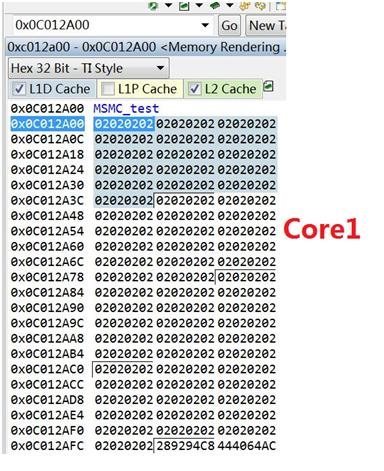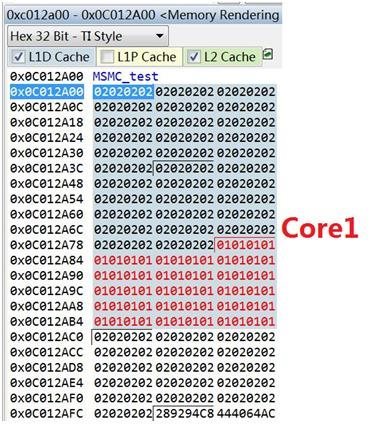Hi all,
I met a problem about cache coherence when L1D is cacheable on C6670.
My code is base on sys/bios 6.33, C6670 and CCSv5.3.
***************************************************************************************************
I just want to use a 256 bytes buffer on MSMC and use core0 writes this buffer and then the core0 inform core1 to print this buffer on CCS's console.
**************************************************************************************************
To do this, my code flow is below
1). Define a global buffer MSMC_test
#defineMSMC_test_len 256
#pragma DATA_ALIGN (MSMC_test, 64) // to align with the L1D cache line
#pragma DATA_SECTION (MSMC_test, ".shareMemotest");
unsigned char MSMC_test[MSMC_test_len];
in the CMD file
.shareMemotest load >> MSMCSRAM
2). Before the tasks runs, I set L1P, L1D cacheable but L2 not.
CACHE_setL1PSize(CACHE_L1_32KCACHE);
CACHE_setL1DSize(CACHE_L1_32KCACHE);
CACHE_setL2Size(CACHE_0KCACHE);
3). Core0 writes the MSMC_test[0~256] then write-back-invalidates the L1D on Core0
for(i=0;i<MSMC_test_len;i++)
MSMC_test[i] = test_cnt;
CACHE_wbInvL1d ((void *) MSMC_test, MSMC_test_len, CACHE_WAIT);
4). Then the core0 send a notification to Core1.
5). Then Core1 invalidates the L1D on Core1 and print the MSMC_test[0~256] on the console
CACHE_invL1d((void *) MSMC_test, MSMC_test_len, CACHE_WAIT);
for(i=0;i<MSMC_test_len;i++)
{
System_printf("%d ",MSMC_test[i]);
if(i%20 == 0)
System_printf("\n");
}
**************************************************************************************************
My problem
1. In the 5) step, when the Core1 prints the MSMC_test[0~127], all things go correct. I can get the correct results on console and the Memory Broswer is below
2. But when the Core1 prints the MSMC_test[128], the Memory Broswer shows the MSMC_test[128~191] changes to the last data like below (to begin with, Core0 writes 0x01 to MSMC_test[0~256] and the second time Core0 writes 0x02 to MSMC_test[0~256])
So I can not get the correct on console.
***************************************************************************************************
Could anyone help me!
Regards,
Feng



